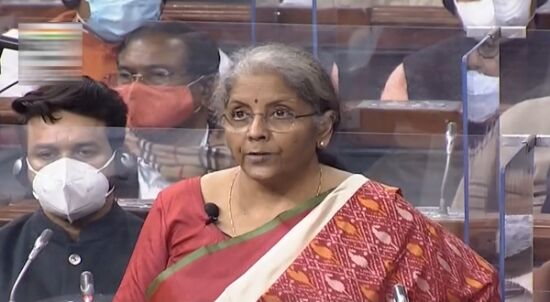RS returns Finance Bill 2021, completing Parl approval

New Delhi: Finance Minister Nirmala Sitharaman on Wednesday said there is no risk of India's sovereign rating being downgraded as a result of higher deficits, as the Rajya Sabha returned the Finance Bill 2021 without suggesting any change to complete the Parliamentary approval for Budget 2021-22.
The Lok Sabha had on Tuesday approved the Finance Bill 2021 -- which contains tax proposals for the next fiscal year beginning April 1 -- after accepting some government amendments such as raising provident fund ceiling for tax-free interest to Rs 5 lakh and platforms such as Amazon not being liable for the equalisation levy as long as the goods and services listed are owned or provided by an Indian permanent establishment of the overseas entity.
The bill was debated in the Upper House, which returned it without suggesting any change or amendment.
Replying to the debate, Sitharaman said the government does not see a risk of a sovereign rating downgrade because of incurring a higher deficit arising from increased spending being done to boost the economy.
"India enjoys an investment-grade rating and we are not foreseeing any change or any chance of a downgrade due to us incurring higher deficits," she said, adding the higher deficit was resulting from higher spending and increased borrowings.
Stating that economists and rating agencies are of the opinion that governments need to spend to put the pandemic-hit economies back on track, she said India too followed the same advice.
"So globally that is the advice everybody is receiving and we are also following. So it shouldn't hurt our rating," she said.
Sitharaman, however, had to curtail her speech following a verbal duel with TMC members over the implementation of central government schemes in West Bengal.
As infuriated TMC members continued to protest, Rajya Sabha Deputy Chairman Harivansh asked the minister to conclude and then put the Finance Bill to vote.
The bill and government amendments were approved by voice vote and the bill returned.
For the sake of parliamentary approval, Finance Bill is classified as a 'Money Bill' -- one that contains provisions related to taxation, borrowing of money by the government, expenditure from or receipt to the Consolidated Fund of India.
If such recommendations are not given within 14 days, it will deemed to be passed by Parliament. The two houses had previously approved the Appropriation Bill, authorising spending of certain sum of money.
With the Rajya Sabha returning the Finance Bill 2021, the Parliamentary approval for Budget 2021-21 has been completed.
Replying to the debate, Sitharaman cited low inflation, higher GDP growth, record foreign investment and lower fiscal deficit to defend her government's handling of the economy.
She attacked the Congress-led UPA government for leaving a "mess" and mismanaging the economy which the Modi administration set right.
The measures taken in response to the 2008 global financial crisis by the UPA led to high inflation and 'taper tantrums', she said. Sitharaman further said average GDP growth between 2014 to 2019 was 7.5 per cent as against 6.7 per cent during 2009 to 2014 under UPA.
Similarly, consumer price inflation was 10.3 per cent under five years of UPA rule, while during 2014-19 it was 4.8 per cent.
Fiscal deficit too has been contained at 3.65 per cent of the GDP during 2014-19 as compared to 5.3 per cent in the previous five years, she said, adding current account deficit has also improved from (-)3.34 per cent to (-)1.43 per cent.
Foreign exchange reserves have grown from $303 billion in 2014 to $411.9 billion, she said, adding NPAs or bad debt declined to Rs 8.99 lakh crore as of March 2020.



